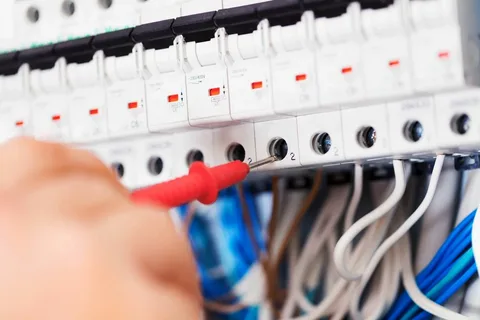Electrical issues are a frequent concern in homes throughout Alabama. Whether the house is older with outdated wiring or a newer build with improper installations, electrical problems can pose safety hazards and disrupt daily life. Homeowners who experience flickering lights, tripped breakers, or malfunctioning outlets may not realize that these small inconveniences could be signs of larger issues. Understanding the most common electrical problems in Alabama homes can help residents take the right steps to keep their households safe.
Circuit Breakers That Trip Frequently
A circuit breaker is designed to protect a home’s electrical system by shutting off power when an overload or short circuit occurs. However, when breakers trip repeatedly, it often signals a deeper issue. Many homes in Alabama, particularly older ones, may not have electrical panels equipped to handle the increased power demand from modern appliances.
When a home’s wiring cannot support the number of devices being used at once, the breaker will trip to prevent overheating. While resetting the breaker may restore power temporarily, it does not address the root of the problem. An electrician can assess whether the panel needs an upgrade or if certain circuits need to be redistributed to balance the load. Electrical companies can also determine if the tripping breaker is a sign of faulty wiring that could become a fire hazard if ignored.
Flickering Or Dimming Lights
Lights that flicker or dim unexpectedly can be frustrating, but they often indicate an issue with the electrical system. A loose connection, overloaded circuit, or failing fixture may be responsible for the inconsistency. In some cases, flickering lights are a sign that the home’s wiring is outdated and struggling to support modern electrical demands.
Alabama homeowners who experience frequent dimming when turning on large appliances may need to have their wiring evaluated. If the lights flicker throughout the house rather than in one area, the problem could stem from an issue with the main power supply. An electrician company can determine whether the problem is with the home’s internal wiring or if the electric utility needs to be contacted.
Dead Outlets And Faulty Switches
An outlet that no longer provides power can be an indication of a tripped breaker, a blown fuse, or faulty wiring. In many cases, outlets stop working due to wear and tear over time, particularly in older homes where wiring may not have been updated. Outlets and switches can also become loose or damaged, leading to inconsistent performance and potential safety risks.
A dead outlet may also be connected to a ground fault circuit interrupter (GFCI) that has tripped. GFCI outlets are typically found in bathrooms, kitchens, and outdoor areas where moisture is present. If pressing the reset button on the GFCI outlet does not restore power, there may be a wiring problem that requires professional attention. Electrical companies can identify whether the issue is isolated to a single outlet or part of a larger electrical failure.
Outdated Or Faulty Wiring
Many Alabama homes, especially those built decades ago, still have wiring that does not meet modern electrical safety standards. Outdated wiring materials such as aluminum or knob-and-tube wiring are more susceptible to overheating and deterioration, increasing the risk of electrical fires. Faulty wiring can also cause outlets to spark, appliances to malfunction, and lights to flicker unpredictably.
Signs of deteriorating wiring include a burning smell, scorch marks on outlets, and frequently tripping breakers. If these warning signs are ignored, the risk of fire increases significantly. Hiring an electrician to inspect the home’s wiring can help identify weak points before they become hazardous. An electrician company can also recommend panel upgrades or rewiring services to ensure the home is safe and up to code.
Power Surges And Electrical Spikes
Power surges can damage appliances, electronics, and even the electrical system itself. These sudden spikes in voltage may occur due to external factors such as lightning strikes or power grid fluctuations, but they can also be caused by faulty wiring or overloaded circuits within the home. Alabama’s stormy weather makes homes particularly vulnerable to power surges, making surge protection an essential precaution.
Repeated electrical surges can shorten the lifespan of expensive devices, leading to costly replacements. Homeowners who notice their appliances failing sooner than expected or experiencing sudden shutdowns may have an issue with their electrical system. Electrical companies can install whole-home surge protection systems to prevent unexpected voltage spikes from damaging valuable equipment.
Taking Action To Prevent Electrical Hazards
Electrical issues should never be ignored, as they can escalate into serious safety hazards if left unaddressed. Alabama homeowners experiencing any of these problems should seek the expertise of an electrician before small inconveniences turn into dangerous situations. Electrical companies have the knowledge and equipment needed to diagnose and repair issues efficiently, ensuring homes remain safe and functional.
Preventative maintenance can help reduce the risk of electrical failures. Scheduling routine inspections with an electrician can uncover hidden problems before they cause damage. Keeping an eye out for signs of electrical wear and tear, such as warm outlets, buzzing noises, or a sudden loss of power, can also prevent dangerous situations from developing.
Understanding the most common electrical problems in Alabama homes allows residents to take proactive measures to protect their property and loved ones. Whether the issue is minor or severe, working with a trusted electrician company ensures that the electrical system remains reliable and safe.


